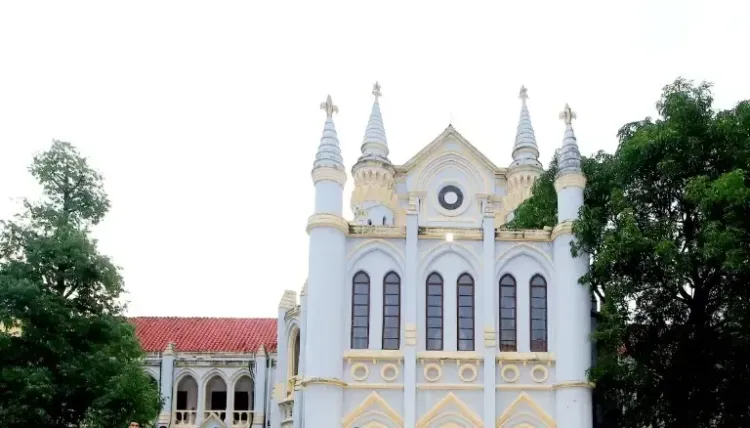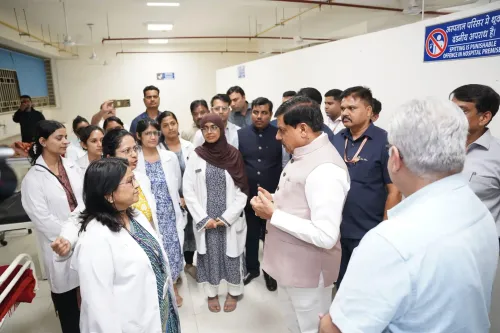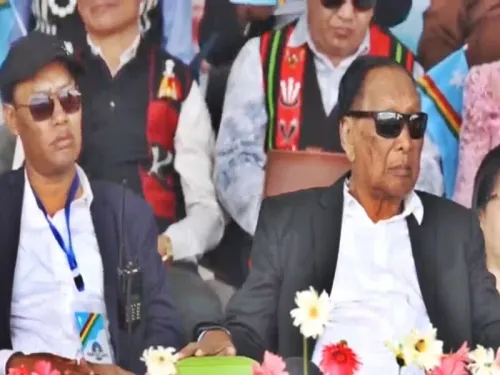Is the Teachers' E-Attendance Policy Fair? A Dispute Reaches MP High Court

Synopsis
Key Takeaways
- 27 educators challenge e-attendance app
- Privacy concerns raised over personal data
- Salary deductions for non-compliance reported
- Government cites accountability as rationale
- Mass protests erupt among teachers statewide
Jabalpur, Oct 24 (NationPress) A collective of 27 dissatisfied educators has approached the High Court of Madhya Pradesh in Jabalpur, contesting the obligatory use of the 'Hamare Shikshak (Our Teacher)' app for electronic attendance tracking.
This legal action, initiated by local resident Mukesh Singh Barkade along with fellow educators from various districts, has propelled the contentious e-attendance policy into the legal arena, underscoring significant concerns regarding technology's encroachment into the teaching profession.
The Madhya Pradesh High Court has requested a response from the state government, with the next hearing scheduled for October 30. The court has instructed the government to provide a comprehensive reply by this date.
Advocate Anshuman Singh, representing the aggrieved educators, argued that the implementation of the app has led to numerous practical challenges, complicating routine responsibilities into bureaucratic hurdles. This system is not just an administrative tool; it jeopardizes the trust fundamental to the teaching profession, Singh asserted.
Central to the controversy is the School Education Department's order, effective from July 1, mandating all government school teachers -- over 3.5 lakh across the state -- to document their attendance using the app.
Upon arriving at school, teachers are required to take a “live selfie” with students, upload it for GPS verification, and repeat this process at the end of the day. Failure to comply results in salary deductions, a penalty that has already affected thousands.
Reports from teacher association leaders in Vidisha district indicate that a staggering 1,723 out of 2,190 guest teachers (around 79 percent) have experienced pay cuts for non-compliance, igniting outrage and fears of financial hardship among low-wage contract staff.
Similar situations have arisen in Anuppur, where initial audits revealed zero compliance, prompting urgent warnings from the Directorate of Public Instruction (DPI).
The backlash has been intense. Teacher unions, including the Provincial Teachers' Union and guest educator federations, have condemned the system as “inhuman and impractical”, a sentiment echoed in demonstrations across Umaria, Chhindwara, and Indore.
In Damoh, frustrated educators presented memoranda to Collector Sudhir Kumar Kochar, threatening street protests unless the order for salary cuts is revoked. Balaghat saw a mass strike by thousands of guest teachers, who protested the lack of basic infrastructure. “Rural schools lack network coverage, and many of us cannot afford smartphones or data packs,” lamented one demonstrator.
Privacy issues are also a major concern, with allegations that the app compromises personal information, violating constitutional rights to dignity and data protection. A female teacher refused to comply with e-attendance, citing privacy violations as the mobile phone was her personal property, not government-issued, and she cannot grant access to a third-party application.
A decade earlier, in 2014, the High Court rejected a similar challenge to phone-based e-attendance, labeling it a progressive reform for accountability. However, the current version -- supported by the 'Hamare Shikshak' platform launched in June -- has exacerbated issues.
Teachers argue that it diminishes professional autonomy, treating them as “machines” rather than mentors.
“We shape futures, not merely fill registers. This surveillance culture wounds the essence of teaching,” expressed a union leader from Gwalior, where over 22,000 educators are contending with the mandate.
The government's stance is clear: to reduce absenteeism and improve punctuality in a sector plagued by irregularities.
Officials from the Directorate of Public Instructions (DPI) cite successful pilots in urban areas, asserting that the app promotes transparency. However, critics argue that without addressing the digital divide in rural areas -- where 40 percent of schools remain offline -- the policy is a formula for inequality.
Guest teachers, often earning meager stipends of Rs 8,000-12,000 monthly, bear the brunt of the policy, with unions threatening statewide protests if the High Court does not intervene.








